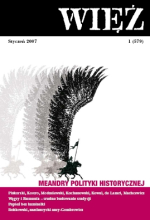
We kindly inform you that, as long as the subject affiliation of our 300.000+ articles is in progress, you might get unsufficient or no results on your third level or second level search. In this case, please broaden your search criteria.



Poles are unwillingly watching that Germans are organising musea for displayed Germans from Silesia and Pomerania. Are Poles not doing the same planing an Institute for the Former Polish Eastern Borderland?
More...


"An average Romanian believes that his nation is not 200 but 2000 years old." "Romanians have a Slavonic complex."
More...
Map of the Carpathain region is a guide to the Hungarian history.
More...

KRZYSZTOF DYBCIAK Zaatlantycki anty-Gombrowicz Andrzej Bobkowski: Listy do Tymona Terleckiego 1956-1961, oprac. i posłowie Nina Taylor-Terlecka, Biblioteka Więzi, Warszawa 2006, s. 251. WOJCIECH SKRODZKI Zwierciadło Evdokimowa Paul Evdokimow: Sztuka ikony. Teologia piękna, tłum. z języka francuskiego Maria Żurowska, Wydawnictwo Księży Marianów, Warszawa 2006, s. 300. MAŁGORZATA FELICKA Albo życie, albo wolność? Eutanazja: Prawo do życia - prawo do wolności, red. Barbara Chyrowicz SSpS, Towarzystwo Naukowe KUL, Lublin 2005, s. 212. ANNA KAROŃ-OSTROWSKA 155 Do czytania poleca
More...






The author firstly analyses the needs of national minorities and their associations according to their specific financial re-quirements. He substantiates and justifies these needs by pointing to the fact that the members of a national minority have a different identity from the majority population and have a desire to preserve it; their needs cannot be satisfied adequately by what the state can offer, especially in the areas of language, culture and education. In his search for standard guidelines, which grant minorities and/or their members the right to appropriate state support, the author establishes that both the Framework Convention for the Protection of National Minorities and the European Charter for Regional or Minority Languages do in fact contain the relevant calls for action to member states, but no quantifiable and enforceable rights for minorities. Also, analysis of German law and administrative practice at federal and state level does in fact reveal fundamentally positive statements on the protection of national minorities, but – with the exception of the very clear right to establish private schools in Schleswig-Holstein – no standard regulations, which would grant an adequate, enduring and legally en-forceable financial framework to an individual minority. The author recommends that minorities and their associations should present their legitimate needs effectively at a political level.
More...

In 1924 the first settlement in Central Lusatia, Neu-Laubusch/Nowy Lubuš, fell victim to open-cast mining for lignite. Thus arose a conflict about cause and effect in an industrial society, and the history of discourse relating to this extends into the present day, developing as a result into an important element in individual identity in this area. This essay uses selected examples from fiction, poetry and functional literature to trace some dominant features of this discourse. This process results in a division into three parts, which coincide with historical turning points. Up to 1945 a basic nar-rative pattern develops, which oscillates between welcoming progress and melancholy over the loss of the traditional rural homeland. In the GDR period this bipolar narrative structure is continued against the background of the construction of socialism, in which the search to locate “the Sorbian component” together with that for a new image of the homeland appear as additional facets. The period after 1990, which was initially characterised by a reduction in industrial activity, and finally a discussion over the future energy policy of Germany, resulted in a diffuse picture of narratives, which were partly competing with each other, and which reveals a broken, shifting identity landscape for Lusatia.
More...

A national Polish institution designed to coordinate activities in relation to the Sorbs was created in Poznań on 5 and 6 October 1946. The main focus was on the current development of the Sorbs and Lusatia after the war, together with the organisation of courses in Sorbian studies and research. All institutions involved in this question in Poland met in Cracow on 30 January 1947. A statute relating to this work was put together, which assigned individual tasks and elected Professor Tadeusz Stanisław Grabowski as chairman of the committee. The task of the scientific committee, as it was called, was to find a solution to the Sorbian or Lusation question. Several options were discussed in this respect: they ranged from remaining in Germany within an autonomous province, or the possibility of becoming part of Czechoslovakia or Poland, to the creation of an independent Sorbian state. Contacts existed on the one hand with the Domowina in Lusatia, and on the other hand with the Sorbian National Committee operating in Prague. In addition, the scientific committee composed a memorandum, which demanded the free development of the Sorbian nation. But already by November 1947 the organisation was forced to suspend its political activities in relation to the Sorbian question, as Poland did not want to get into a political conflict with the Soviet Union. The committee only remained active to a limited extent in academic matters.
More...